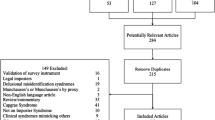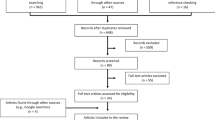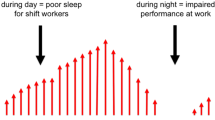Abstract
Purpose
The aim of this study is to evaluate the prevalence, severity, and risk factors of cancer-related fatigue among currently working cancer survivors.
Methods
We searched the PubMed, Embase, Scopus, CINAHL, Cochrane Library, and ICHUSHI databases. The risk of bias was evaluated independently using the Risk of Bias Assessment Tool for Non-randomized Studies (RoBANS). A meta-analysis was conducted to determine the prevalence, severity, and related factors associated with cancer-related fatigue among currently working cancer survivors.
Results
Our meta-analysis included 18 studies and revealed that 42.2% of currently working cancer survivors experience cancer-related fatigue. The fatigue severity in this group was significantly higher than that in workers without cancer (absolute standardized mean difference (SMD) = 0.67), but lower than that in cancer survivors who had previously worked and were not currently working (absolute SMD = 0.72). Distress was identified as a potential risk factor for cancer-related fatigue in working cancer survivors (partial correlation coefficient = 0.38).
Conclusions
The high prevalence of cancer-related fatigue among employed cancer survivors underscores the need for targeted workplace interventions and fatigue management strategies. While the severity of fatigue is less than that seen in non-working survivors, the comparison with the general working population highlights a significant health disparity. The association between distress and fatigue suggests the necessity for a holistic approach to fatigue management that considers both physical and mental factors in working cancer survivors.
Implications for Cancer Survivors
Our findings highlight the critical need for healthcare professionals and employers to monitor fatigue levels among working cancer survivors and offer appropriate support.



Similar content being viewed by others
Data availability
No datasets were generated or analysed during the current study.
References
Berger AM, Mooney K, Alvarez-Perez A, Breitbart WS, Carpenter KM, Cella D, Cleeland C, Dotan E, Eisenberger MA, Escalante CP, et al. Cancer-felated fatigue, Version 2.2015. J Natl Compr Canc Netw. 2015. https://doi.org/10.6004/jnccn.2015.0122.
Goedendorp MM, Gielissen MFM, Verhagen CAHHVM, Bleijenberg G. Development of fatigue in cancer survivors: a prospective follow-up study from diagnosis into the year after treatment. J Pain Symptom Manage. 2013. https://doi.org/10.1016/j.jpainsymman.2012.02.009.
Jones JM, Olson K, Catton P, Catton CN, Fleshner NE, Krzyzanowska MK, McCready DR, Wong RKS, Jiang H, Howell D. Cancer-related fatigue and associated disability in post-treatment cancer survivors. J Cancer Surviv. 2016. https://doi.org/10.1007/s11764-015-0450-2.
Servaes P, Gielissen MFM, Verhagen S, Bleijenberg G. The Course of severe fatigue in disease-free breast cancer patients: a longitudinal study. Psychooncology. 2007. https://doi.org/10.1002/pon.1120.
Bower JE. Cancer-related fatigue: mechanisms, risk factors, and treatments. Nat Rev Clin Oncol. 2014. https://doi.org/10.1038/nrclinonc.2014.127.
Al Maqbali M, Hughes C, Gracey J, Rankin J, Dunwoody L, Hacker E. Quality assessment criteria: psychometric properties of measurement tools for cancer related fatigue. Acta Oncol. 2019. https://doi.org/10.1080/0284186X.2019.1622773.
Blinder VS, Gany FM. Impact of cancer on employment. J Clin Oncol. 2020. https://doi.org/10.1200/JCO.19.01856.
Endo M. Work sustainability among Japanese cancer survivors. Japanese Society of Health Education and Promotion. 2019. https://doi.org/10.11260/kenkokyoiku.27.91.
Duijts SFA, van Egmond MP, Spelten E, van Muijen P, Anema JR, van der Beek AJ. Physical and psychosocial problems in cancer survivors beyond return to work: a systematic review. Psychooncology. 2014. https://doi.org/10.1002/pon.3467.
Ota A, Li Y, Yatsuya H, Tanno K, Sakata K, Yamagishi K, Iso H, Yasuda N, Saito I, Kato T, et al. Working cancer survivors’ physical and mental characteristics compared to cancer-free workers in Japan: a nationwide general population-based study. J Cancer Surviv. 2021. https://doi.org/10.1007/s11764-020-00984-7.
Yi JC, Syrjala KL. Anxiety and depression in cancer survivors. Med Clin North Am. 2017. https://doi.org/10.1016/j.mcna.2017.06.005.
Brown LF, Kroenke K. Cancer-related fatigue and its associations with depression and anxiety: a systematic review. Psychosomatics. 2009. https://doi.org/10.1176/appi.psy.50.5.440.
Weber D, O’Brien K. Cancer and cancer-related fatigue and the interrelationships with depression, stress, and inflammation. J Evid Based Complementary Altern Med. 2017. https://doi.org/10.1177/2156587216676122.
Vanrusselt D, Sleurs C, Prikken S, Raymaekers K, Verschueren S, Lemiere J, Luyckx K, Uyttebroeck A. Associations between cancer-related distress and fatigue in childhood cancer survivors: a longitudinal study. Psychooncology. 2022. https://doi.org/10.1002/pon.6084.
Tan CJ, Yip SYC, Chan RJ, Chew L, Chan A. Investigating how cancer-related symptoms influence work outcomes among cancer survivors: a systematic review. J Cancer Surviv. 2022. https://doi.org/10.1007/s11764-021-01097-5.
Vlaski T, Slavic M, Caspari R, Fischer H, Brenner H, Schöttker B. Development trajectories of fatigue, quality of life, and the ability to work among colorectal cancer patients in the first year after rehabilitation—first results of the MIRANDA Study. Cancers. 2023. https://doi.org/10.3390/cancers15123168.
Ma Y, He B, Jiang M, Yang Y, Wang C, Huang C, Han L. Prevalence and risk factors of cancer-related fatigue: a systematic review and meta-analysis. Int J Nurs Stud. 2020. https://doi.org/10.1016/j.ijnurstu.2020.103707.
Stroup DF, Berlin JA, Morton SC, Olkin I, Williamson GD, Rennie D, Moher D, Becker BJ, Sipe TA, Thacker SB. Meta-analysis of observational studies in epidemiology: a proposal for reporting. Meta-Analysis Of Observational Studies in Epidemiology (MOOSE) Group. JAMA. 2000. https://doi.org/10.1001/jama.283.15.2008.
Kim SY, Park JE, Lee YJ, Seo HJ, Sheen SS, Hahn S, Jang BH, Son HJ. Testing a tool for assessing the risk of bias for nonrandomized studies showed moderate reliability and promising validity. J Clin Epidemiol. 2013. https://doi.org/10.1016/j.jclinepi.2012.09.016.
Kang YE, Yoon JH, Park N, Ahn YC, Lee EJ, Son CG. Prevalence of cancer-related fatigue based on severity: a systematic review and meta-analysis. Sci Rep. 2023. https://doi.org/10.1038/s41598-023-39046-0.
Baguley T. Standardized or simple effect size: what should be reported? Br J Psychol. 2009. https://doi.org/10.1348/000712608X377117.
Balak F, Roelen CAM, Koopmans PC, Ten Berge EE, Groothoff JW. Return to work after early-stage breast cancer: a cohort study into the effects of treatment and cancer-related symptoms. J Occup Rehabil. 2008. https://doi.org/10.1007/s10926-008-9146-z.
Ahn E, Cho J, Shin DW, Park BW, Ahn SH, Noh DY, Nam SJ, Lee ES, Yun YH. Impact of breast cancer diagnosis and treatment on work-related life and factors affecting them. Breast Cancer Res Treat. 2009. https://doi.org/10.1007/s10549-008-0209-9.
Calvio L, Peugeot M, Bruns GL, Todd BL, Feuerstein M. Measures of cognitive function and work in occupationally active breast cancer survivors. J Occup Environ Med. 2010. https://doi.org/10.1097/JOM.0b013e3181d0bef7.
de Boer AGEM, Bruinvels DJ, Tytgat KMaJ, Schoorlemmer A, Klinkenbijl JHG, Frings-Dresen MHW. Employment status and work-related problems of gastrointestinal cancer patients at diagnosis: a cross-sectional study. BMJ Open. 2011. https://doi.org/10.1136/bmjopen-2011-000190.
Moskowitz MC, Feuerstein M, Todd BL. Job stress and physical activity related to elevated symptom clusters in breast cancer survivors at work. J Occup Environ Med. 2013. https://doi.org/10.1097/JOM.0b013e31826eef97.
Tevaarwerk AJ, Lee JW, Sesto ME, Buhr KA, Cleeland CS, Manola J, Wagner LI, Chang VTS, Fisch MJ. Employment outcomes among survivors of common cancers: the Symptom Outcomes and Practice Patterns (SOAPP) Study. J Cancer Surviv. 2013. https://doi.org/10.1007/s11764-012-0258-2.
Tanaka K, Tachi T, Asano S, Osawa T, Kawashima A, Hori A, Yasuda M, Mizui T, Nakada T, Tsuchiya T, et al. Impact of outpatient chemotherapy-related adverse effect on daily life and work productivity in breast cancer patients. Jpn J Pharma Health Care Sci. 2015. https://doi.org/10.5649/jjphcs.41.515.
Horsboel TA, Bültmann U, Nielsen CV, Nielsen B, Andersen NT, de Thurah A. Are fatigue, depression and anxiety associated with labour market participation among patients diagnosed with haematological malignancies? a prospective study. Psychooncology. 2015. https://doi.org/10.1002/pon.3658.
Dorland HF, Abma FI, Roelen CaM, Smink A, Feuerstein M, Amick BC, Ranchor AV, Bültmann U. The cognitive symptom checklist—work in cancer patients is related with work functioning, fatigue and depressive symptoms: a validation study. J Cancer Surviv. 2016. https://doi.org/10.1007/s11764-015-0500-9.
Von Ah D, Storey S, Crouch A, Johns SA, Dodson J, Dutkevitch S. Relationship of self-reported attentional fatigue to perceived work ability in breast cancer survivors. Cancer Nurs. 2017. https://doi.org/10.1097/NCC.0000000000000444.
Ekenga CC, Pérez M, Margenthaler JA, Jeffe DB. Early-stage breast cancer and employment participation after 2 years of follow-up: a comparison with age-matched controls. Cancer. 2018. https://doi.org/10.1002/cncr.31270.
Schmidt ME, Scherer S, Wiskemann J, Steindorf K. Return to work after breast cancer: the role of treatment-related side effects and potential impact on quality of life. Eur J Cancer Care (Engl). 2019. https://doi.org/10.1111/ecc.13051.
Clin B, Heutte N, Boulanger M, Troussard X, Cornet E, Damaj GL, Bouvier V, Guizard AV, Launoy G, Licaj I. Analysis of medico-social factors for return to work among patients presenting with haematological malignancy (adamantine): results of a “pilot study.” BMC Res Notes. 2020. https://doi.org/10.1186/s13104-020-05149-4.
Boelhouwer IG, Vermeer W, van Vuuren T. Late effects of cancer treatment, job resources, and burnout complaints among employees with a breast cancer diagnosis 2–10 years ago: a longitudinal study. Front Psychol. 2021. https://doi.org/10.3389/fpsyg.2021.793138.
van Loon EMP, Ernens W, Heijenbrok-Kal MH, Horemans HLD, Ribbers GM, van den Bent MJ. Long-term employment status and the association with fatigue in patients with grade II glioma. J Rehabil Med. 2021. https://doi.org/10.2340/16501977-2837.
Jin J. Factors associated with the quality of work life among working breast cancer survivors. Asia Pac J Oncol Nurs. 2022. https://doi.org/10.1016/j.apjon.2021.11.005.
Bøhn SKH, Vandraas KF, Kiserud CE, Dahl AA, Thorsen L, Ewertz M, Lie HC, Falk R, Reinertsen KV. Work status changes and associated factors in a nationwide sample of Norwegian long-term breast cancer survivors. J Cancer Surviv. 2022. https://doi.org/10.1007/s11764-022-01202-2.
Zheng D, Marbut AR, Zhang J, O’Keefe LC. The contribution of psychological resilience and job meaningfulness to well-being of working cancer survivors. Workplace Health Saf. 2022. https://doi.org/10.1177/21650799221085466.
Migliavaca CB, Stein C, Colpani V, Barker TH, Ziegelmann PK, Munn Z, Falavigna M, Prevalence Estimates Reviews-Systematic Review Methodology Group (PERSyst). Meta-analysis of prevalence: I2 statistic and how to deal with heterogeneity. Res Synth Methods. 2022. https://doi.org/10.1002/jrsm.1547.
Boelhouwer IG, Vermeer W, van Vuuren T. The associations between late effects of cancer treatment, work ability and job resources: a systematic review. Int Arch Occup Environ Health. 2021. https://doi.org/10.1007/s00420-020-01567-w.
Aritake S, Kaneita Y, Ohtsu T, Uchiyama M, Mishima K, Akashiba T, Uchimura N, Nakaji S, Munezawa T, Ohida T. Prevalence of fatigue symptoms and correlations in the general adult population. Sleep Biol Rhythms. 2015. https://doi.org/10.1111/sbr.12099.
Ricci JA, Chee E, Lorandeau AL, Berger J. Fatigue in the U.S. workforce: prevalence and implications for lost productive work time. J Occup Environ Med. 2007. https://doi.org/10.1097/01.jom.0000249782.60321.2a.
Wolvers MDJ, Leensen MCJ, Groeneveld IF, Frings-Dresen MHW, De Boer AGEM. Longitudinal associations between fatigue and perceived work ability in cancer survivors. J Occup Rehabil. 2019. https://doi.org/10.1007/s10926-018-9814-6.
Islam T, Dahlui M, Majid HA, Nahar AM, MohdTaib NA, Su TT, MyBCC Study Group. Factors associated with return to work of breast cancer survivors: a systematic review. BMC Public Health. 2014. https://doi.org/10.1186/1471-2458-14-S3-S8.
Spelten ER, Verbeek JHaM, Uitterhoeve ALJ, Ansink AC, van der Lelie J, de Reijke TM, Kammeijer M, de Haes JCJM, Sprangers MaG. Cancer, fatigue and the return of patients to work-a prospective cohort study. Eur J Cancer. 2003. https://doi.org/10.1016/s0959-8049(03)00364-2.
Ota A, Kawada K, Tsutsumi A, Yatsuya H. Cross-sectional association between working and depression prevalence in cancer survivors: a literature review. Env Occup Health Pract. 2020. https://doi.org/10.1539/eohp.2020-0006-RA.
Mustian KM, Alfano CM, Heckler C, Kleckner AS, Kleckner IR, Leach CR, Mohr D, Palesh OG, Peppone LJ, Piper BF, et al. Comparison of pharmaceutical, psychological, and exercise treatments for cancer-related Fatigue: a meta-analysis. JAMA Oncol. 2017. https://doi.org/10.1001/jamaoncol.2016.6914.
Rodriguez-Gonzalez A, Velasco-Durantez V, Martin-Abreu C, Cruz-Castellanos P, Hernandez R, Gil-Raga M, Garcia-Torralba E, Garcia-Garcia T, Jimenez-Fonseca P, Calderon C. Fatigue, emotional distress, and illness uncertainty in patients with metastatic cancer: Results from the prospective NEOETIC_SEOM study. Curr Oncol. 2022. https://doi.org/10.3390/curroncol29120763.
Butt Z, Rao AV, Lai JS, Abernethy AP, Rosenbloom SK, Cella D. Age-associated differences in fatigue among patients with cancer. J Pain Symptom Manage. 2010. https://doi.org/10.1016/j.jpainsymman.2009.12.016.
Bruggeman-Everts FZ, Wolvers MDJ, van de Schoot R, Vollenbroek-Hutten MM, Van der Lee ML. Effectiveness of two web-based interventions for chronic cancer-related fatigue compared to an active control condition: results of the “Fitter Na Kanker” randomized controlled trial. J Med Internet Res. 2017. https://doi.org/10.2196/jmir.7180.
Compen F, Bisseling E, Schellekens M, Donders R, Carlson L, van der Lee M, Speckens A. Face-to-face and Internet-based mindfulness-based cognitive therapy compared with treatment as usual in reducing psychological distress in patients with cancer: A multicenter randomized controlled trial. JCO. 2018. https://doi.org/10.1200/JCO.2017.76.5669.
van der Lee M, Ranchor AV, Garssen B, Sanderman R, Schroevers MJ, Roelen C. Predictors of returning to work after receiving specialized psycho-oncological care. Health Psychol Bull. 2020. https://doi.org/10.5334/hpb.4.
Riba MB, Donovan KA, Andersen B, Braun I, Breitbart WS, Brewer BW, Buchmann LO, Clark MM, Collins M, Corbett C, et al. Distress management, version 3.2019, NCCN clinical practice guidelines in oncology. J Natl Compr Canc Netw. 2019. https://doi.org/10.6004/jnccn.2019.0048.
Dauphin S, Jansen L, De Burghgraeve T, Deckx L, Buntinx F, van den Akker M. Long-term distress in older patients with cancer: a longitudinal cohort study. BJGP Open. 2019. https://doi.org/10.3399/bjgpopen19X101658.
Acknowledgements
We thank the authors of the primary studies included in this meta-analysis for their excellent contributions to the literature. We would like to thank Editage (www.editage.jp) for English language editing.
Funding
This study was supported by JSPS KAKENHI, Grant Number JP22K17403, to M.M. The funder did not interfere with the authors' discretion while conducting this study.
Author information
Authors and Affiliations
Contributions
Conceptualization, M.M.; methodology, M.M.; software, M.M.; validation, M.M., A.O. and H.Y.; formal analysis, M.M.; investigation—abstract screening, M.M., M.T.K, X.S., R.O.; investigation—full-text screening, M.M., Y.H., resources, M.M.; data curation, M.M.; writing—original draft preparation, M.M.; writing—review and editing, Y.H., M.T.K, X.S., R.O., Y.L., A.O., and H.Y.; visualization, M.M.; supervision, M.M.; project administration, M.M.; funding acquisition, M.M. All authors have read and agreed to the published version of the manuscript.
Corresponding author
Ethics declarations
Institutional review board statement
This meta-analysis did not require ethical approval as it was based on previously published studies and did not involve human subjects or identifiable data.
Informed consent
Informed consent was not required because the study was based on previously published studies and did not involve human subjects or identifiable data.
Conflict of interest
The authors declare no conflict of interest.
Additional information
Publisher's Note
Springer Nature remains neutral with regard to jurisdictional claims in published maps and institutional affiliations.
Supplementary Information
Below is the link to the electronic supplementary material.
Rights and permissions
Springer Nature or its licensor (e.g. a society or other partner) holds exclusive rights to this article under a publishing agreement with the author(s) or other rightsholder(s); author self-archiving of the accepted manuscript version of this article is solely governed by the terms of such publishing agreement and applicable law.
About this article
Cite this article
Matsunaga, M., He, Y., Khine, M.T. et al. Prevalence, severity, and risk factors of cancer-related fatigue among working cancer survivors: a systematic review and meta-analysis. J Cancer Surviv (2024). https://doi.org/10.1007/s11764-024-01557-8
Received:
Accepted:
Published:
DOI: https://doi.org/10.1007/s11764-024-01557-8




